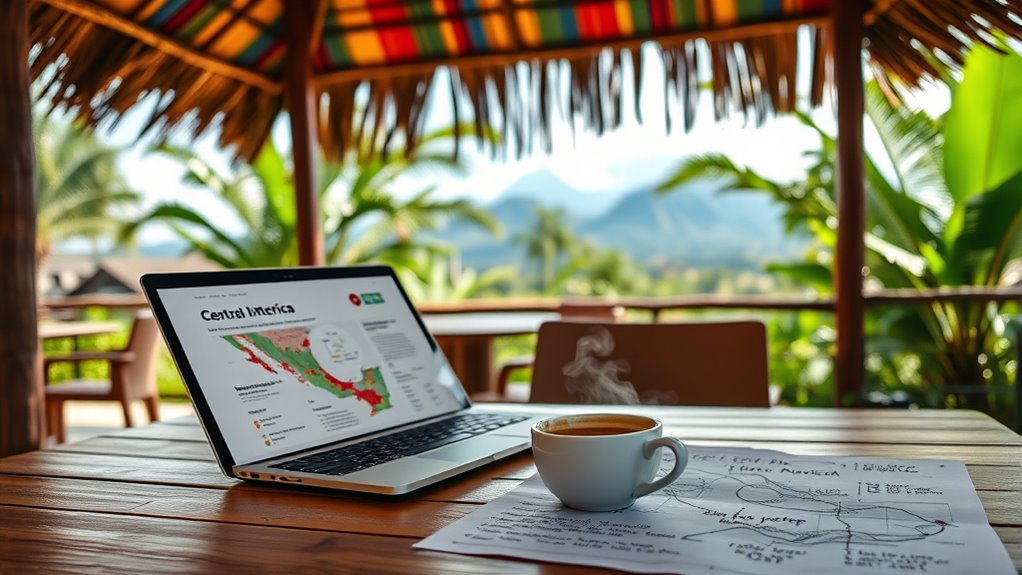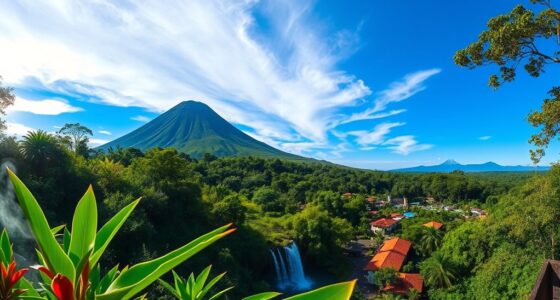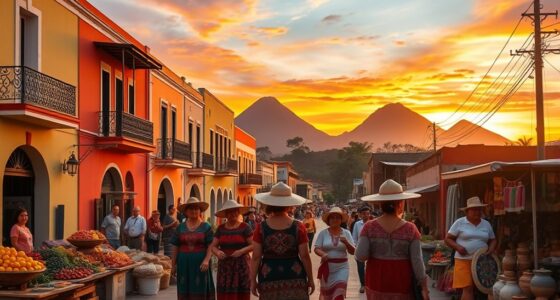If you’re considering working remotely in Central America, you’ll find countries like Costa Rica, Belize, Colombia, and Mexico offer various visa options, from digital nomad visas to tourist permits. You’ll need proof of income, valid documents, and health insurance to apply. Living conditions and internet quality vary, especially between urban and rural areas. Understanding each country’s requirements and infrastructure will help your move go smoothly. Explore further to uncover detailed steps and tips for a successful nomadic experience.
Key Takeaways
- Overview of visa options, costs, and living conditions in Central American countries suitable for digital nomads.
- Essential documentation, income verification, and legal requirements for remote work visas.
- Health insurance mandates and application procedures for staying compliant during extended stays.
- Internet infrastructure quality and accessibility in urban vs. rural areas impacting remote work.
- Tips for selecting optimal locations based on cost, connectivity, safety, and lifestyle preferences.
Overview of Digital Nomad Visas in Central America

Central America is becoming a popular destination for digital nomads thanks to its growing number of visa options tailored for remote workers. Countries like Costa Rica, Belize, and Colombia offer specific visas that let you live and work legally for extended periods. Costa Rica’s Digital Nomad Visa allows stays of up to two years, while Belize issues a six-month visa for remote workers earning a minimum income. Colombia’s visa requires proof of remote work and a monthly income of at least $900. Although Mexico doesn’t have a dedicated digital nomad visa, its 90-day tourist visa remains a common choice for short-term stays. Each country’s visa terms vary, with different requirements, durations, and application processes designed to attract remote workers seeking flexible living options across the region. Additionally, understanding the hardware and connectivity options available is crucial for maintaining productivity while working abroad.
Key Requirements and Eligibility Criteria

To qualify for a digital nomad visa, you’ll need to demonstrate proof of stable income that meets each country’s specific standards. You’ll also be required to submit essential documents like a valid passport, photos, and sometimes criminal background checks. Additionally, maintaining health insurance with adequate coverage is mandatory for your entire stay. Familiarity with personal development techniques such as goal setting and mindfulness can also support your overall well-being during your travels.
Income Verification Standards
What proof of income do you need to qualify for a digital nomad visa in Central America? You typically must demonstrate a stable income that meets or exceeds country-specific thresholds. For example, Costa Rica requires at least $3,000 per month for individuals or $4,000 for families, supported by bank statements, pay stubs, or contracts. Belize demands an annual income of $75,000, verifiable through official documents. Colombia requires proof of earning at least $900 monthly, usually via contracts or bank statements. You’ll need to provide official documentation like pay slips, bank statements, or client letters confirming your earnings. Ensuring your income proof is current, authentic, and clearly demonstrates your ability to support yourself during your stay is essential to meet the eligibility standards. Additionally, some countries emphasize regional flavors and traditions to assess the authenticity of your income sources and cultural integration efforts.
Document Submission Essentials
When submitting documents for a digital nomad visa in Central America, you need to guarantee all your paperwork meets specific criteria to prove your eligibility. Confirm your passport is valid for the entire stay and includes recent passport-sized photos. Many countries require a clean criminal record certificate, often issued within recent months. You’ll also need to provide proof of stable income, such as bank statements or official letters, demonstrating you meet minimum income thresholds. Documentation confirming your remote work, like contracts or letters of employment, is typically necessary. Some countries, like Costa Rica, require sworn affidavits, certified translations, or apostilled documents. Double-check country-specific requirements to avoid delays or rejection, and keep all documents organized for smooth processing. Additionally, reviewing forsale 100 guidelines can help ensure you meet all official documentation standards.
Health Insurance Mandates
Health insurance is a mandatory requirement for digital nomads applying for visas in Central America, ensuring you have coverage for medical emergencies during your stay. You must show proof of insurance with minimum coverage thresholds, such as $50,000 for Costa Rica and Belize. Travel insurance generally isn’t accepted; only valid health policies count. Your insurance should be active for the entire duration of your visa. Some countries also specify coverage for repatriation and COVID-19 treatment. Be prepared to provide documentation like policy certificates or proof of purchase. Different countries have specific eligibility criteria, and failure to meet these can lead to visa denial. Make sure your insurance aligns with local requirements to enjoy a worry-free stay. The security features integrated into the application process help protect your personal information when submitting proof of coverage.
Step-by-Step Application Procedures

To start your application, you need to gather all the required documentation, like proof of income, valid passport, and health insurance. Make sure you organize everything neatly and follow each country’s specific requirements to avoid delays. Once prepared, you can submit your application through the proper channels, whether online or in person, depending on the destination. Additionally, understanding the privacy and cookie usage policies of official government sites can help safeguard your personal information during the application process.
Gather Required Documentation
Gathering the required documentation is a crucial first step in your digital nomad visa application process. You’ll need a valid passport with at least six months of remaining validity, along with passport-sized photos. Proof of stable income is essential—such as bank statements, employment letters, or contracts—showing you meet the country’s minimum earnings, like $900/month for Colombia or $75,000/year for Belize. You’ll also need proof of remote work, such as work contracts or business letters. Health insurance covering your entire stay with minimum coverage amounts is mandatory, often requiring documentation. Some countries, like Costa Rica, also require sworn affidavits, certified translations, or apostilled documents. Ensure all paperwork is up-to-date, accurate, and meets the specific country’s requirements before submitting your application. Additionally, understanding the benefits of homemade fruit juices can promote healthier habits during your travels.
Submit Application Properly
Once you’ve prepared all the necessary documents, the next step is to submit your application correctly to guarantee a smooth process. First, double-check that everything is complete and accurate, including your passport, proof of income, health insurance, and any supporting paperwork. For Costa Rica and Colombia, you’ll typically upload documents through official online portals, ensuring files are clear and properly formatted. Belize’s application is fully online, with payment made upon approval at the airport or embassy. Follow the specific instructions for each country carefully—some may require sworn affidavits or certified translations. Submit your application well before your planned travel date to avoid delays. Keep copies of all submitted materials and confirmation receipts. Proper submission helps prevent rejections and speeds up your approval process. Additionally, understanding the application procedures for each country can significantly improve your chances of approval.
Costs and Financial Considerations

Costs and financial considerations for digital nomads in Central America vary markedly depending on the country and lifestyle choices. You’ll need to budget for visas, application fees, and living expenses, which differ widely. Here’s a quick overview:
| Country | Visa Fee | Monthly Living Cost | Internet Speed |
|---|---|---|---|
| Costa Rica | $100 USD | $1,200 – $2,000 | Fast, reliable |
| Belize | Pay upon arrival | $1,000 – $1,500 | Moderate, variable |
| Colombia | Varies, up to $300 | $800 – $1,300 | Good in cities |
| Mexico | No visa fee, 90 days | $1,000 – $1,800 | Variable, urban focus |
Factor in visa costs, living standards, and internet quality to plan your budget effectively. Additionally, understanding internet speed and reliability can significantly impact your ability to work remotely efficiently.
Living Conditions and Internet Connectivity

Living conditions and internet connectivity are pivotal factors to contemplate when choosing a destination in Central America as a digital nomad. Costa Rica offers reliable internet and modern amenities, especially in major cities like San José, making remote work seamless. Belize features beautiful beaches and natural attractions, but internet speeds can vary in more remote areas, so verifying connectivity before booking is wise. Colombia’s cities like Medellín provide good infrastructure, with fast internet and coworking spaces that suit remote workers. In general, urban centers tend to have better connectivity, while rural areas might pose challenges. Keep in mind that internet quality and cost differ across countries, so evaluating local infrastructure is essential for maintaining productivity and enjoying a comfortable lifestyle. Internet infrastructure varies significantly between urban and rural areas, impacting remote work possibilities.
Tax Implications and Legal Considerations

Understanding the tax implications and legal considerations is essential when choosing a digital nomad destination in Central America, as visa status alone doesn’t guarantee exemption from local taxes. You need to be aware of how your income and residency affect your tax obligations. Some countries offer tax incentives or benefits for remote workers, but others may require you to pay local taxes based on your stay or income sources. Failing to comply can lead to penalties or legal issues. To stay compliant, consider these points:
Understanding tax and legal rules is crucial for digital nomads in Central America to avoid penalties.
- Verify if your visa grants tax residency or if you’ll be considered a non-resident.
- Understand income tax rules applicable to digital nomads in your chosen country.
- Consult a tax professional familiar with expat and remote work regulations.
- Keep detailed records of your income, stay duration, and work activities to support your legal status.
Frequently Asked Questions
Can Digital Nomads Work Remotely for Companies Outside Central America?
Yes, you can work remotely for companies outside Central America while visiting, but you’ll need the right visa. Many countries, like Costa Rica and Belize, require proof of remote work and stable income. Make sure your employer supports your visa application and that you comply with local laws. Keep in mind, working remotely doesn’t mean you’re automatically tax-exempt, so consult a tax professional to avoid issues.
Are There Any Language Requirements for Visa Applications?
You won’t need to worry about language requirements for visa applications, as most Central American countries prioritize your proof of income, remote work, and background checks. While some countries, like Costa Rica and Colombia, may request documents in Spanish or require certified translations, there’s no strict language test. Instead, focus on gathering your paperwork, ensuring your documents are properly translated if needed, and demonstrating your ability to support yourself during your stay.
How Do Tax Obligations Differ Between Countries in the Region?
You should know that tax obligations vary across Central American countries. In Costa Rica and El Salvador, digital nomads might benefit from favorable tax policies or exemptions, but you’ll need to check local laws and possibly pay taxes on income earned within the country. In Colombia and Belize, you may have to declare worldwide income or pay local taxes depending on your residency status. Always consult a tax professional to stay compliant.
Is Health Insurance Mandatory for Visa Approval?
Yes, health insurance is mandatory for visa approval in many Central American countries. You need to show proof of valid health coverage that meets the minimum requirements, such as coverage of at least $50,000. This guarantees you’re protected during your stay. Make sure your insurance is valid for the entire duration of your visa, as some countries also require travel insurance, though it’s usually not accepted instead of local coverage.
Can I Extend or Renew My Digital Nomad Visa After the Initial Period?
Can you extend or renew your digital nomad visa after the initial period? In many countries like Costa Rica, you can renew your visa for an additional year, provided you meet the requirements, such as proof of income and valid health insurance. Belize offers a 6-month visa with no explicit renewal process, while Colombia allows extensions if you maintain your remote work status. Always check specific country regulations before your visa expires to avoid issues.
Conclusion
As you imagine yourself working beachfront cafes with the sun warming your skin and ocean waves whispering nearby, Central America’s digital nomad visas open the door to this vibrant, flexible lifestyle. With clear steps and affordable options, you’re ready to embrace the adventure—balancing work and exploration amid lush jungles, colorful streets, and endless horizons. Your new journey awaits, where every sunrise sparks fresh inspiration in this tropical paradise.










